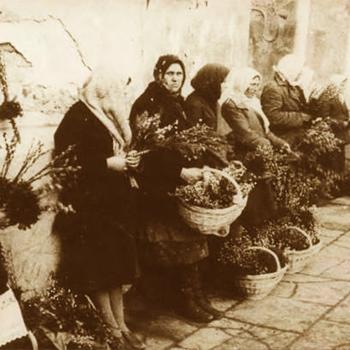John Steinbeck, American novelist, winner of the Nobel Prize for literature, and one of my signal early spiritual guides died on this day, the 20th of December in 1968. Since his death Steinbeck’s fortunes have fallen and risen, sometimes lauded, sometimes dismissed, perhaps demonstrating his complexity.
Steinbeck is of course the author Grapes of Wrath which was published on the 14th of April, 1939, a bit more than eighty years ago. It was wildly successful. He won the Pulitzer Prize and the National Book award for it. Later, when Steinbeck received the Nobel Prize in literature Grapes was mentioned as principal among his writings.
The following year John Ford’s masterwork film based on his novel put the story and its themes out to an even larger audience. Woody Guthrie then turned it into a song.
I read it in my late adolescence. And after that a number of his other books. But Grapes would prove to be one of the formative reads in my young life. The book said some hard things about our country, about capitalism, about the rich and the poor. And by the time I had finished reading it, I realized whose side I was on. My understanding has nuanced over the years. Today I consider myself a type of social democrat. But as best as I can recall, casting my memory back, most of it started with him, and with that book.
However, today, I would say more important is how he informed my spirituality. Spirituality, spiritualities, I believe are wisely the foundation for one’s political views.
Steinbeck was a life-long Episcopalian. Not, I believe, particularly active. And a simple google search will turn up a lot of people who want us to know he wasn’t any kind of Christian worth calling by that designation. Often those of that view want the reader to know he wasn’t much of a writer, either. Whatever, he never ceased being a member of the Episcopal church, and did attend services on occasion. When he was dying he is said to have told his doctor he had no belief in an afterlife, but he very much wanted an Episcopalian funeral.
Grapes cuts to the core of the religious question, I feel. In that novel the heart of the matter is sung to us by Preacher Casey, failed minister, broken heart, witness to all that is, and some of the worst of that up front and ugly. Out of this terrible wound he sang of a great mystery.
“Before I knowed it, I was sayin’ out loud, ‘The hell with it! There ain’t no sin and there ain’t no virtue. There’s just stuff people do. It’s all part of the same thing.’… I says, ‘What’s this call, this sperit?’ An’ I says, ‘It’s love. I love people so much I’m fit to bust, sometimes.’… I figgered, ‘Why do we got to hang it on God or Jesus? Maybe,’ I figgered, ‘maybe it’s all men an’ all women we love; maybe that’s the Holy Sperit-the human sperit-the whole shebang. Maybe all men got one big soul ever’body’s a part of.’ Now I sat there thinkin’ it, an’ all of a suddent-I knew it. I knew it so deep down that it was true, and I still know it.”
Today I’d call this a form of nonduality. And another word for this is love. I don’t know for sure. But this might be the first time I was touched by that teaching.
And I began a quest that led me on a path to knowing this down deep and true for myself. Like a taste of water. And knowing it and it’s qualities.
He reflected on this mystery a lot. In big ways like in this novel. And in smaller and more intimate ways. Love is a complicated thing. And Steinbeck understood that. There’s a lovely (I’ve seen it all over the web, but this is where I first saw it) letter he wrote in 1958 to his son Thomas, who was in boarding school and wrote home declaring his love for a girl he’d met there.
We had your letter this morning. I will answer it from my point of view and of course, Elaine will from hers.
First — if you are in love — that’s a good thing — that’s about the best thing that can happen to anyone. Don’t let anyone make it small or light to you.
Second — There are several kinds of love. One is a selfish, mean, grasping, egotistical thing which uses love for self-importance. This is the ugly and crippling kind. The other is an outpouring of everything good in you — of kindness and consideration and respect — not only the social respect of manners but the greater respect which is recognition of another person as unique and valuable. The first kind can make you sick and small and weak but the second can release in you strength, and courage and goodness and even wisdom you didn’t know you had.
You say this is not puppy love. If you feel so deeply — of course it isn’t puppy love.
But I don’t think you were asking me what you feel. You know better than anyone. What you wanted me to help you with is what to do about it — and that I can tell you.
Glory in it for one thing and be very glad and grateful for it.
The object of love is the best and most beautiful. Try to live up to it.
If you love someone — there is no possible harm in saying so — only you must remember that some people are very shy and sometimes the saying must take that shyness into consideration.
Girls have a way of knowing or feeling what you feel, but they usually like to hear it also.
It sometimes happens that what you feel is not returned for one reason or another — but that does not make your feeling less valuable and good.
Lastly, I know your feeling because I have it and I’m glad you have it.
We will be glad to meet Susan. She will be very welcome. But Elaine will make all such arrangements because that is her province and she will be very glad to. She knows about love too and maybe she can give you more help than I can.
And don’t worry about losing. If it is right, it happens — The main thing is not to hurry. Nothing good gets away.
Love,
Love.
Nonduality. Boundlessness. God. Intimacy. Love.
Here is the universal message of the engaged heart. Each of us is unique and precious. And each of us shares one soul. We can call it boundlessness. We can call it love. And there is something dynamic about it. Sometimes we have to pay attention to that part about how precious each of us really are. Sometimes we have to pay attention to how we’re all connected.
I’ve found if we find this mystery in the small things, not to dismiss young love as a small thing, not at all, but in the intimate movement of ordinary life, then the grand things may well follow.
It has for me.
And so thank you to John Steinbeck, teacher of love.
***
some fun facts
for a bit more













